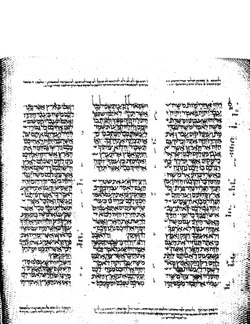Loading AI tools
Book of Joshua, chapter 11 From Wikipedia, the free encyclopedia
Joshua 11 is the eleventh chapter of the Book of Joshua in the Hebrew Bible or in the Old Testament of the Christian Bible.[1] According to Jewish tradition the book was attributed to Joshua, with additions by the high priests Eleazar and Phinehas,[2][3] but modern scholars view it as part of the Deuteronomistic History, which spans the books of Deuteronomy to 2 Kings, attributed to nationalistic and devotedly Yahwistic writers during the time of the reformer Judean king Josiah in 7th century BCE.[3][4] This chapter focuses on the conquest of the land of Canaan by the Israelites under the leadership of Joshua,[5] a part of a section comprising Joshua 5:13–12:24 about the conquest of Canaan.[6]
| Joshua 11 | |
|---|---|
 The pages containing the Book of Joshua in Leningrad Codex (1008 CE). | |
| Book | Book of Joshua |
| Hebrew Bible part | Nevi'im |
| Order in the Hebrew part | 1 |
| Category | Former Prophets |
| Christian Bible part | Old Testament |
| Order in the Christian part | 6 |
This chapter was originally written in the Hebrew language. It is divided into 23 verses.
Some early manuscripts containing the text of this chapter in Hebrew are of the Masoretic Text tradition, which includes the Codex Cairensis (895), Aleppo Codex (10th century), and Codex Leningradensis (1008).[7]
Extant ancient manuscripts of a translation into Koine Greek known as the Septuagint (originally was made in the last few centuries BCE) include Codex Vaticanus (B; B; 4th century) and Codex Alexandrinus (A; A; 5th century).[8][a]
The narrative of the Israelites conquering the land of Canaan comprises verses 5:13 to 12:24 of the Book of Joshua and has the following outline:[10]
The narrative of the northern conquest begins with the familiar formula,'when x heard'—here Jabin, king of Hazor, who then formed an alliance with kings around the area to prepare for the battle against the Israelites.[11] No specific military or strategic plan is detailed of a march north by Joshua and Israel, except for an image of a surprise attack to the alliance camp at Merom (verse 7).[12] The fulfilment of YHWH's command (to Moses, then from Moses to Joshua) is the most important element in the narrative of Joshua's success (verses 6, 9, 15), which also includes the hamstringing of the Canaanites' horses and the burning of their chariots (verse 9).[13] The following conquest extends to the Mediterranean far to the north at Sidon (as far as 'Lebanon and... to the Western Sea' in Deuteronomy), then turning south-eastwards over Lake Huleh (now a fertile plain) towards Hazor, which is burned after the execution of the herem ("ban"; verses 10–15), whereas other cities are also destroyed, but not burned.[13]

Verses 16–20 summarize the area of the land now under Israel's control, from south to north — Mount Halak on the borderland of Edom (Seir) in the far south-east; Baal-gad near Mt. Hermon in the far north. The victory over the kings of the land is emphasized by a repetition (verses 17–18), with the exception of Gibeon (a blemish on the record), underlined by the rationale: God 'hardened their hearts' against Israel (cf. Pharaoh against Moses in Exodus 7:13; see Joshua 10:20), so that they might be utterly destroyed (referring to herem or the "ban").[13] The Anakim (verses 21–23) had inspired fear in Israel, when the spies first surveyed the land (Numbers 13:28; Deuteronomy 1:28), but the report of the victory here removed the misplaced fear, and witnesses the promise fulfillment of Deuteronomy 9:1–3.[13] The phrase 'the land had rest from war' recalls Deuteronomy 12:10, which anticipates the life of Israel in the land after all wars are won and the land is divided among all tribes.[13]
This verse summarizes the activities recorded in the book thus far.[16] The note that the land was divided for the tribes of Israel and that the land rested were past events for the narrator, but are still future in the narrative.[16]
Seamless Wikipedia browsing. On steroids.
Every time you click a link to Wikipedia, Wiktionary or Wikiquote in your browser's search results, it will show the modern Wikiwand interface.
Wikiwand extension is a five stars, simple, with minimum permission required to keep your browsing private, safe and transparent.